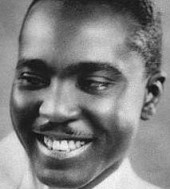Jimmie Lunceford
1902 - 1947
Alto saxophonist and bandleader. Lunceford's band was one of the finest orchestras of the swing era, its well-drilled sound and the precision of its section playing being unrivalled by any other group. Lunceford's reluctance to pay for additional singers and dancers to tour with his band led to his musicians doing this themselves, and earning the nickname 'the performing seals'.
Lunceford's disciplinarian style began when he was a schoolteacher in Memphis, and put together a band from among his students and his former classmates at Fisk University where he had studied music. Future stars of his orchestra included saxophonist Willie Smith and pianist Edwin Wilcox, who were with his first travelling band, the Chickasaw Syncopators.
In early 1934, members of this band, under Lunceford's leadership, moved into the Cotton Club in Harlem, and his great orchestra was born. Through recordings and broadcasts, the band was soon nationally known, and Lunceford began a relentless touring schedule, often covering hundreds of miles between shows, that he kept up until his death from food poisoning at Seaside, Oregon, during a West Coast trip.
His band's relaxed two beat swing on numbers written in the late 1930s by its star trumpeter Sy Oliver became one of its trademarks, but so was the brilliance and verve with which it played uptempo pieces like Flaming Reeds and Screaming Brass, or White Heat. Oliver became one of the band's star singers, as did trombonist Trummy Young, who had a hit with his recording with Lunceford of Tain't What You Do.
The band also played some of the most atmospheric arrangements of the 1930s, using a wide range of special effects, on pieces such as Frisco Fog and Organ Grinder's Swing. When Oliver left, fed up with the touring routine, his replacement Gerald Wilson wrote some genuinely modernistic arrangements such as Hi Spook! before he, too, left.
Despite a high turnover of personnel, Lunceford kept a fine band together until his death, and his public were often unaware of the rapidly changing sidemen, as he insisted his soloists learned their solos from the band's discs, many of which were miniature masterpieces. But without Lunceford himself, the band's driving force was gone, and Wilcox only managed to keep the band together for a few years before it finally folded.
